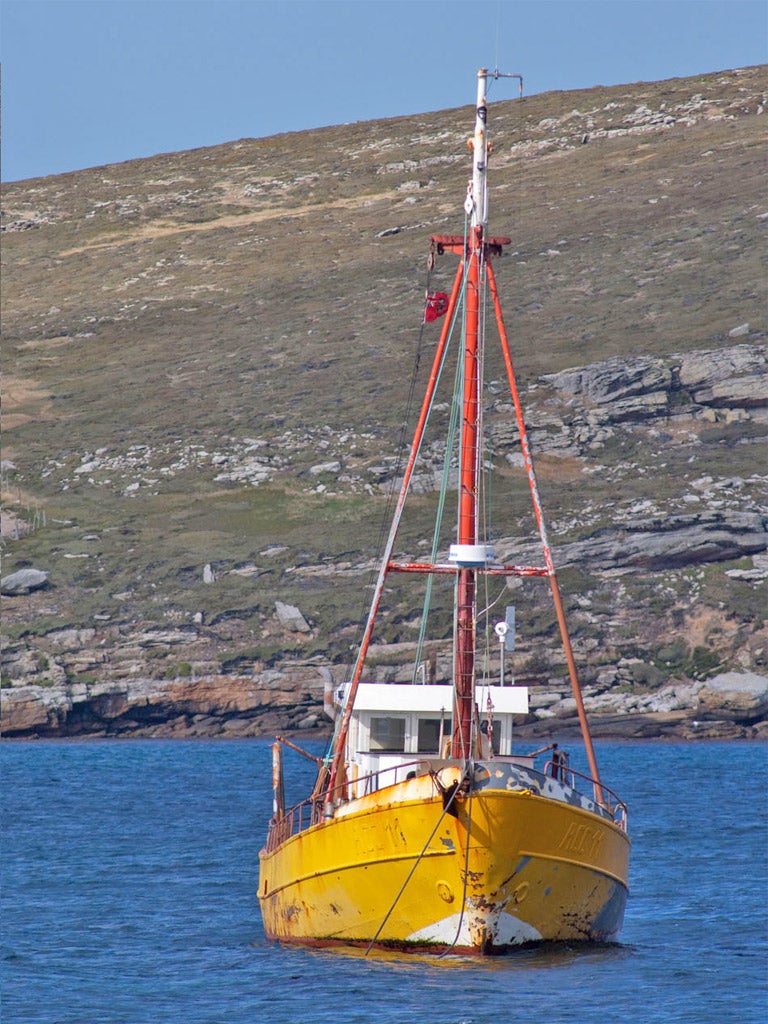UK fury as South America closes ranks to ban Falklands boats
Foreign Office is 'very concerned' over attempts to isolate islands as diplomatic tensions rise

Your support helps us to tell the story
From reproductive rights to climate change to Big Tech, The Independent is on the ground when the story is developing. Whether it's investigating the financials of Elon Musk's pro-Trump PAC or producing our latest documentary, 'The A Word', which shines a light on the American women fighting for reproductive rights, we know how important it is to parse out the facts from the messaging.
At such a critical moment in US history, we need reporters on the ground. Your donation allows us to keep sending journalists to speak to both sides of the story.
The Independent is trusted by Americans across the entire political spectrum. And unlike many other quality news outlets, we choose not to lock Americans out of our reporting and analysis with paywalls. We believe quality journalism should be available to everyone, paid for by those who can afford it.
Your support makes all the difference.The British Government has reacted angrily to a decision by Brazil, Argentina and Uruguay to ban boats flying the Falkland Islands flag from docking in their ports.
The Foreign Office said it was "very concerned" by the "latest Argentine attempt to isolate" the islands and was now in "urgent" discussions with countries in the region. The move, which was announced at a meeting of the South American trading bloc Mercosur in the Uruguayan capital of Montevideo, represents a ratcheting up of diplomatic tensions over the islands.
Last year, a British company announced it had made an oil discovery in the North Falkland basin. Geologists estimate that up to 60 billion barrels of oil and gas equivalent could lie in the Atlantic waters, which would put the region on a par with the North Sea.
Argentina has since increased its claims of sovereignty over the Falklands. Foreign Office sources said the Mercosur decision was similar to one made by the Union of South American Nations last year, which had a minimal effect on Falkland Islands' vessels – predominantly its small fishing fleet.
The sources said in practice the ban tended not to be enforced – and in any event Falkland Islands' vessels also had the right to swap flags to the British ensign on entry to ports and escape the ban.
But the Foreign Office minister Jeremy Browne said there was still no "legal, moral or political justification" for efforts to "intimidate the people of the Falkland Islands". He said: "I have instructed our ambassadors in the region to raise this issue as a matter of urgency to clarify exactly whether or how Mercosur countries propose to implement this agreement. We will then consider our next steps in light of information we receive. But no one should be in any doubt about the British Government's commitment to support the Falkland Islanders' right to determine their own political future."
Last night a former head of the Royal Navy suggested sending a nuclear submarine to the region to show Britain's determination to protect the islands. Lord West, a former First Sea Lord, also suggested carrying out a military exercise to leave Buenos Aires in no doubt that the UK is prepared to defend them.
Cristina Fernandez de Kirchner, the Argentinian President, acknowledged that Britain's oil and gas exploration gave South American countries a reason to join forces on the Falklands issue.
"When you are signing something on the Malvinas in favour of Argentina you are also doing it in your own defence," she said. "Malvinas is not an Argentine cause; it is a global cause, because in the Malvinas they are taking our oil and fishing resources."
Q&A: What's up with Argentina?
Q. Why has the situation got to this stage?
A. Partly for political reasons and partly for economic reasons. Argentina held presidential elections in October and a tough stance on the Falklands was one of Cristina Fernandez de Kirchner's re-election promises. The Argentine government also hopes that if it can bring enough diplomatic pressure to bear on Britain it stands a chance of getting some of the possible revenues from oil and gas reserves from the islands.
Q. Can Falkland Islands vessels just swap flags and sail into port under another country's banner?
A. Yes. The vessels have the right to fly both the Falkland Islands' ensign or the British ensign and all they need to do is swap flags as they come into port. So in reality, the ban is mainly symbolic.
Q. Why have Uruguay, Paraguay and Brazil joined in?
A. The three countries see their national interests as more closely aligned with Argentina, with whom they make up the Mercosur trading bloc, than with Britain. This move has the advantage of pleasing Buenos Aires while having little practical effect on the Falklands.
Oliver Wright
Join our commenting forum
Join thought-provoking conversations, follow other Independent readers and see their replies
Comments